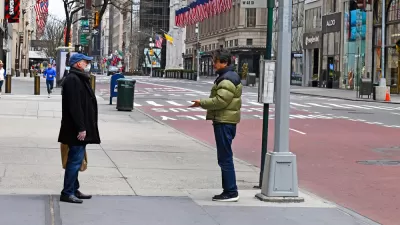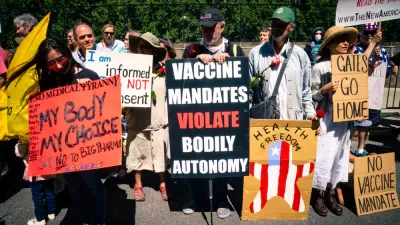A new layer showing the seven-day average of confirmed COVID-19 cases started rolling out to Android and iPhones last week.

Nicole Wetsman reports on a new layer coming to Google Maps that will allow people to keep track COVID-19 infections while navigating the locations of their lives:
Google Maps will soon include information on COVID-19 spread in states, counties, and some cities. Toggling on the “COVID” layer in the app will show the seven-day average number of confirmed cases in each area per 100,000 people. Areas of the map will be color-coded based on case rate, and a label shows if cases are going up or down. The feature will roll out on Android and iOS this week.
According to a blog post written by Sujoy Banerjee, a Google Maps project manager, the new layer will help people to "make more informed decisions about where to go and what to do."
The new COVID-19 map layer pulls data from Johns Hopkins’ COVID-19 dashboard, The New York Times, and Wikipedia, according to Wetsman.
"This is one of many pandemic-related features introduced in Google Maps over the past few months — the app also includes alerts about face-covering mandates on public transportation, information about takeout options at restaurants, and warnings to call ahead to a doctor’s office if you think you have COVID-19," adds Wetsman.
FULL STORY: Google Maps adds an overlay of COVID-19 case trends

Study: Maui’s Plan to Convert Vacation Rentals to Long-Term Housing Could Cause Nearly $1 Billion Economic Loss
The plan would reduce visitor accommodation by 25,% resulting in 1,900 jobs lost.

North Texas Transit Leaders Tout Benefits of TOD for Growing Region
At a summit focused on transit-oriented development, policymakers discussed how North Texas’ expanded light rail system can serve as a tool for economic growth.

Why Should We Subsidize Public Transportation?
Many public transit agencies face financial stress due to rising costs, declining fare revenue, and declining subsidies. Transit advocates must provide a strong business case for increasing public transit funding.

Alabama: Trump Terminates Settlements for Black Communities Harmed By Raw Sewage
Trump deemed the landmark civil rights agreement “illegal DEI and environmental justice policy.”

Dear Tesla Driver: “It’s not You, It’s Him.”
Amidst a booming bumper sticker industry, one writer offers solace to those asking, “Does this car make me look fascist?”

A Visual Celebration of Manhattan’s Chinatown Elder Community, Through Food
Lanterns, cafeteria trays, and community connection take center stage in this stunning photo essay.
Urban Design for Planners 1: Software Tools
This six-course series explores essential urban design concepts using open source software and equips planners with the tools they need to participate fully in the urban design process.
Planning for Universal Design
Learn the tools for implementing Universal Design in planning regulations.
City of Santa Clarita
Ascent Environmental
Institute for Housing and Urban Development Studies (IHS)
City of Grandview
Harvard GSD Executive Education
Toledo-Lucas County Plan Commissions
Salt Lake City
NYU Wagner Graduate School of Public Service





























